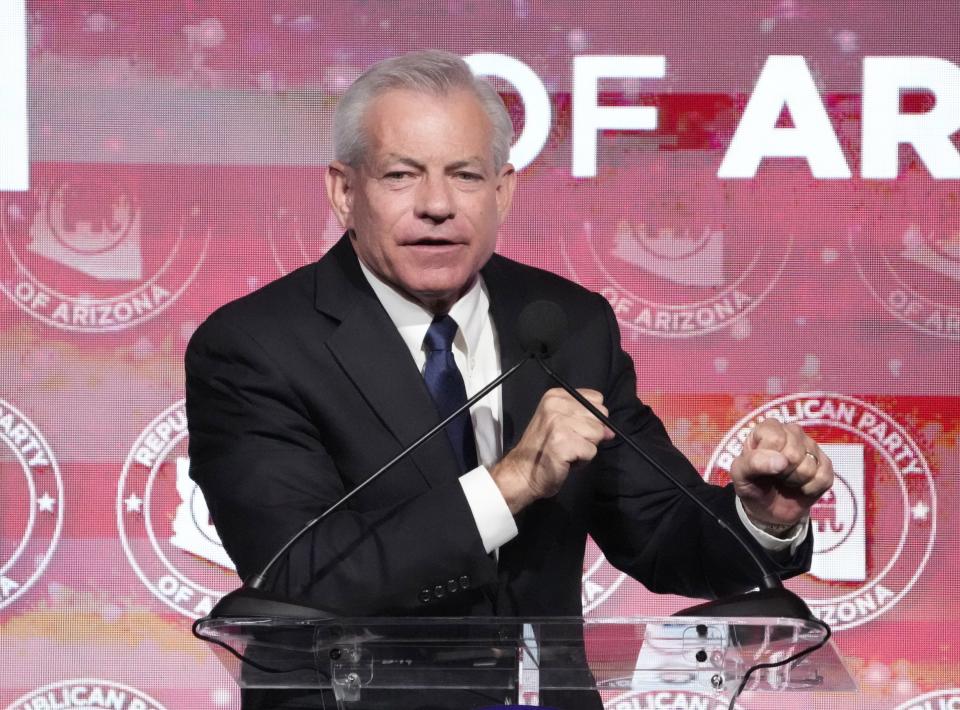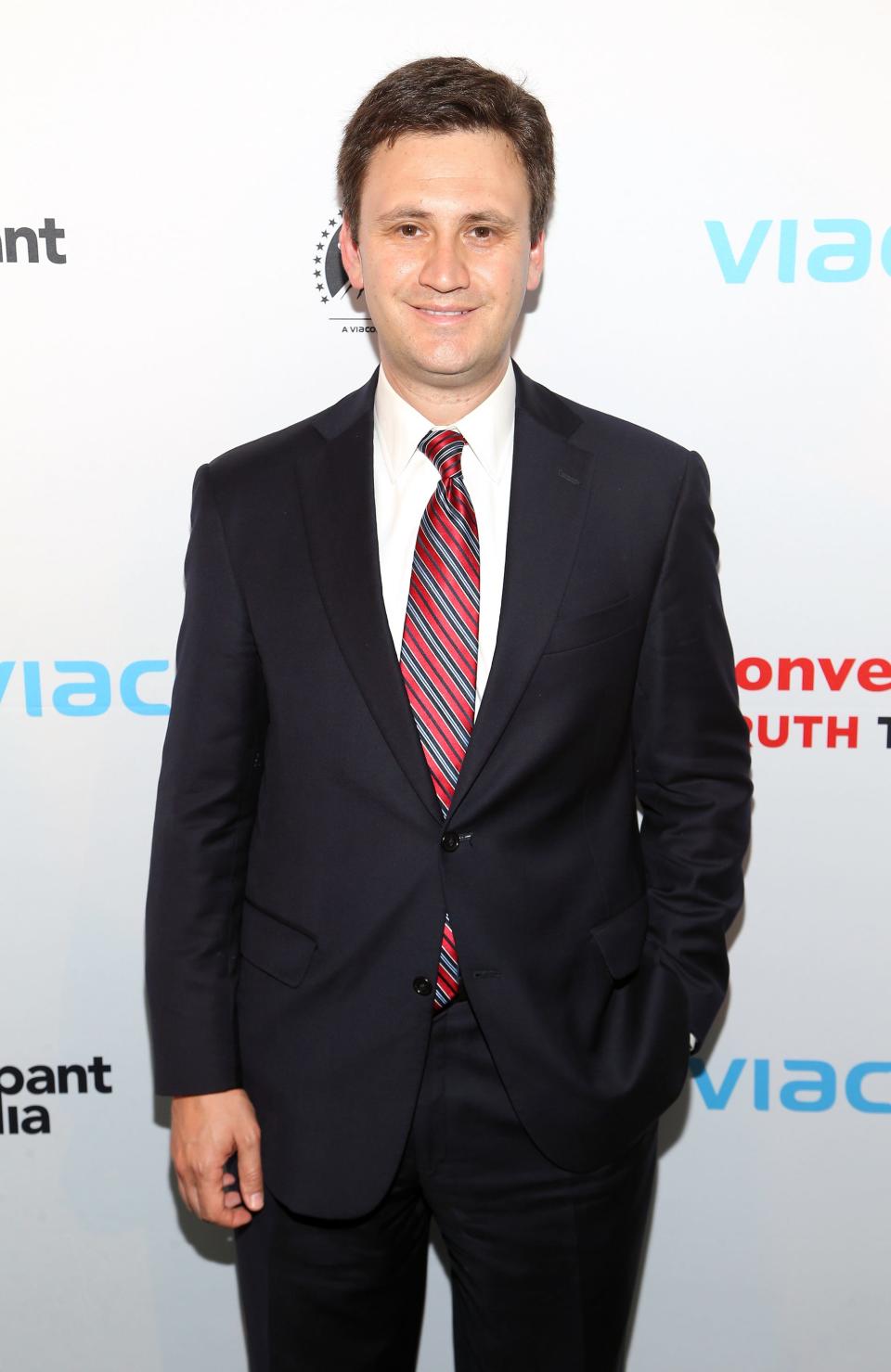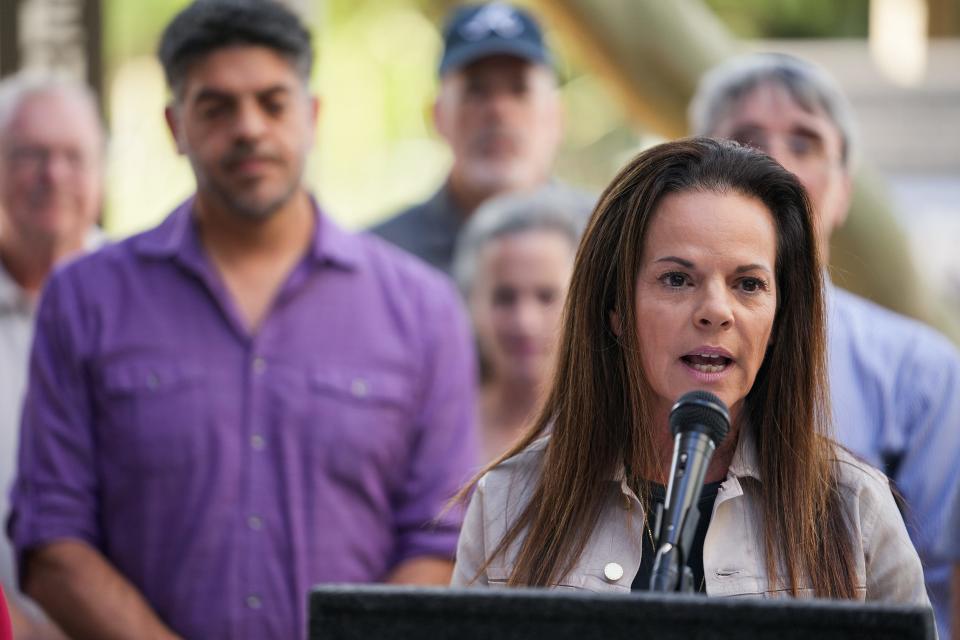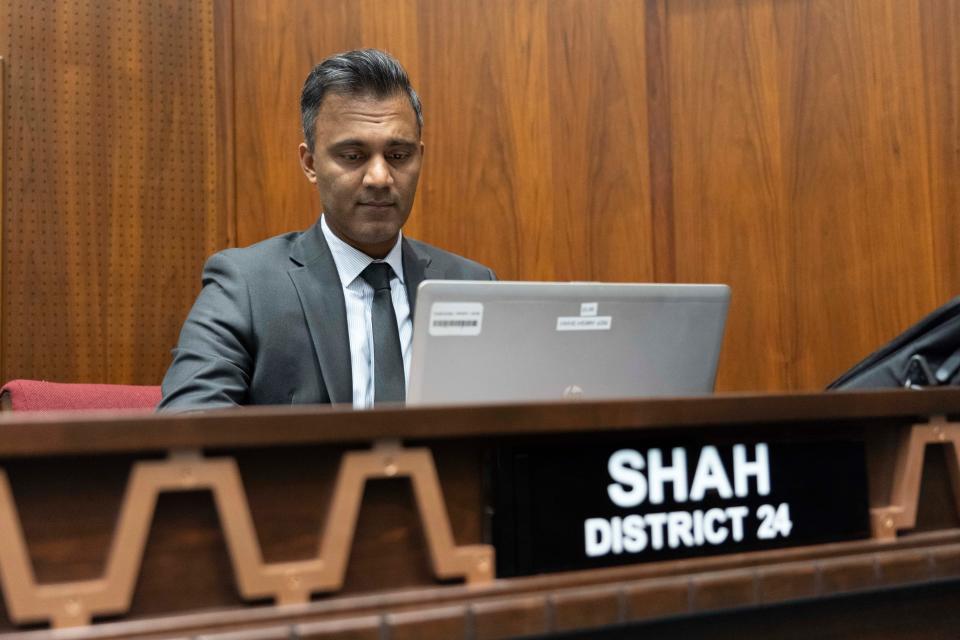Where are Rep. David Schweikert and his Democratic rivals getting their money?
Six Democrats have poured into the race for Arizona's 1st Congressional District in hopes of unseating seven-term Republican incumbent Rep. David Schweikert, who narrowly won in 2022.
But before they get a chance to take on the incumbent, the knives are out in the Democratic primary, where challengers are using decidedly different fundraising strategies.
Schweikert still had the most funds on hand at the end of June, but that could change when the next quarterly reports come out in mid-October.
In the meantime, here are the fundraising highlights for the most financially competitive candidates at this point.
Schweikert has support from real estate, financial industries

Schweikert was first elected to the House in 2010 and is now in his seventh term. He sits on the tax-writing Ways and Means Committee and is chair of its Oversight Subcommittee. He is the vice chair of the bicameral Joint Economic Committee and serves on the Valley Fever Task Force.
Prior to Congress, Schweikert served in the Arizona Legislature and as Maricopa County treasurer.
Because Schweikert is the incumbent, and most of his Democratic would-be challengers lined up to face each other in the primary are political newcomers, there’s more data on his fundraising throughout his political career.
OpenSecrets, a nonprofit that compiles data on political contributions, lists the real estate industry as Schweikert’s largest source of funds, followed by retirees and the securities and investment industry.
Not surprisingly, most of his contributors are from the Phoenix area, followed by Washington, D.C., and then the Tucson area, according to OpenSecrets.
All smiles: Reps. Stanton, Ciscomani and Schweikert share airplane row after speaker vote
The top five biggest contributors to him over his career come from the following companies/groups:
WDP Partners, a commercial real estate firm: $100,800.
The Club for Growth: $77,783.
House Freedom Fund: $68,733.
National Association of Insurance and Financial Advisors: $62,000.
Intel Corp.: $59,520.
Through the first six months of 2023, Schweikert took in $988,000, according to FEC reports. The biggest contributions this year came from the Protect the House 2024 effort established by recently ousted House Speaker Kevin McCarthy, R-Calif.
Freeport McMorRan Inc., Cox Communications, Comcast Corporation/NBC Universal, T-Mobile, State Farm, Lockheed Martin and Salt River Project have contributed to Schweikert through their political committees, among other notable companies.
Challenging Schweikert: These candidates are seeking election in Arizona's 1st Congressional District in 2024
Andrei Cherny leads Democrats so far

Andrei Cherny is the former CEO of Aspiration, a financial services company.
He raised about $628,000 for his campaign through the end of June, according to Federal Election Commission data, though he announced on Oct. 5 that he has surpassed $1 million. Not all candidates have released their next quarterly reports as he did.
A substantial portion of his take through June, about $60,000, has been raised through the ActBlue PAC, where donors can choose to give to all Democrats running in a given state or divvy up their contributions.
Among the individuals who have maxed out contributions to him of $3,300 each for the primary and general is Paradise Valley resident Joe Chen, CEO of Trucker Path, a mobile app for truckers, whose wife also maxed out a contribution to Cherny.
Also maxing out contributions to Cherny is Catharine Soros, who is married to film mogul and CEO of the Los Angeles Media Fund Jeffrey Soros, the nephew of the financier George Soros. Jeffrey Soros also has maxed out contributions to Cherny.
Arizona regent and former candidate for governor Fred DuVal also has contributed to Cherny.
While most of his contributions are from Arizona, Cherny has more donors who have given the maximum amount of $3,300 from California (21) as from Arizona (17).
Marlene Galán-Woods still has friends in Republican circles

Marlene Galán-Woods is a former television journalist and the widow of former Republican Arizona Attorney General Grant Woods.
She raised about $303,000 through June, according to FEC records.
The Federal Election Commission is requesting more information from her campaign because her report indicates she might have taken too much money, from a Republican.
The FEC wants more information on a substantial donation from Republican lawyer Dennis Wilenchik because the way it was initially reported indicated it was more money than is allowed.
But the initial $6,600 donation was amended to represent individual donations of $3,300 from Wilenchik and his wife. That is the limit on such donations to a candidate.
That appears to be OK with the FEC, which oversees campaign contributions. But to reattribute a donation that way, the two people involved in making the donation have to agree to it in writing.
If the money came from a joint account, the campaign committee must notify the account holders of the plan to reattribute the donation and offer a refund, according to the letter the FEC sent Monday to the campaign committee.
"We immediately addressed these clerical errors to ensure we can continue the hard work of knocking on doors and calling voters," campaign manager Aditi Katti said. "We are so excited to have the support of Arizona leaders like (former) Congresswoman (Ann) Kirkpatrick, Attorney General Kris Mayes, and Congressman Raúl Grijalva and look forward to showing voters why Marlene is the candidate who will fight for their rights and freedoms, protect Social Security and Medicare, and take climate action in Congress."
The FEC issue is minor and correctable. But the bigger issue for Galán-Woods could be taking cash from a prominent GOP lawyer in a race against other Democrats hopeful of getting to the House.
Galán-Woods also has contributions from right-leaning publicist Jason Rose, who gave her $1,650, and GOP consultant Chuck Coughlin, who gave $1,000.
“If you’re asking if I think it’s problematic for a Democratic congressional candidate to take money from Republican operatives like the AZGOP lawyer who tried to overturn the election for Donald Trump, and then try to hide it, I do," said Emma Gore, Cherny's campaign manager.
"I also think it's also telling if less than half of your Arizona donors are Democrats. Call me old-fashioned."
Andrew Horne has largely self-funded so far
Andrew Horne is a Phoenix-area native and orthodontist. His major issues include the economy, education, women’s rights and health care.
Through June 30, he had raised $889,000, though about $750,000 of that was a loan to himself, according to FEC records.
Several of his contributors gave $6,600 and had to refile those contributions to split them between the primary and general elections.
Nearly all of his donors who have given at least $3,300 are from Arizona. He has little support from other states other than Nebraska, where he appears to have family.
Amish Shah, a doctor, gets funding from health care workers

State Rep. Amish Shah is an emergency room and sports medicine doctor at the Mayo Clinic in Phoenix.
Shah, who has been in the Arizona Legislature for four years, touts his experience and policy expertise, particularly in health care.
He had raised about $555,0000 through June, according to FEC records.
About 200 of his approximately 700 contributions have come from physicians, dentists, surgeons and other health care workers, according to FEC data.
Kurt Kroemer also his own largest contributor
Kurt Kroemer is a former nonprofit executive who has been CEO of American Red Cross Arizona-New Mexico region and COO of Make-A-Wish Arizona and Humanity United, an organization that works to end genocide and human trafficking.
He raised about $221,000 through June, according to FEC records.
Like Horne, he is his own largest contributor, loaning $140,000 to his campaign.
Conor O'Callaghan enters race but has yet to report funds
Conor O'Callaghan lives in the DC Ranch area of Scottsdale. He moved to Arizona when he was 4 years old and graduated from Chaparral High School.
As the latest entrant into the race, he has yet to file any fundraising data with the FEC.
Didn't back: These 5 House members from Arizona voted no on deal to avert government shutdown
This article originally appeared on Arizona Republic: Where do David Schweikert and Arizona CD1 rivals get campaign money?
